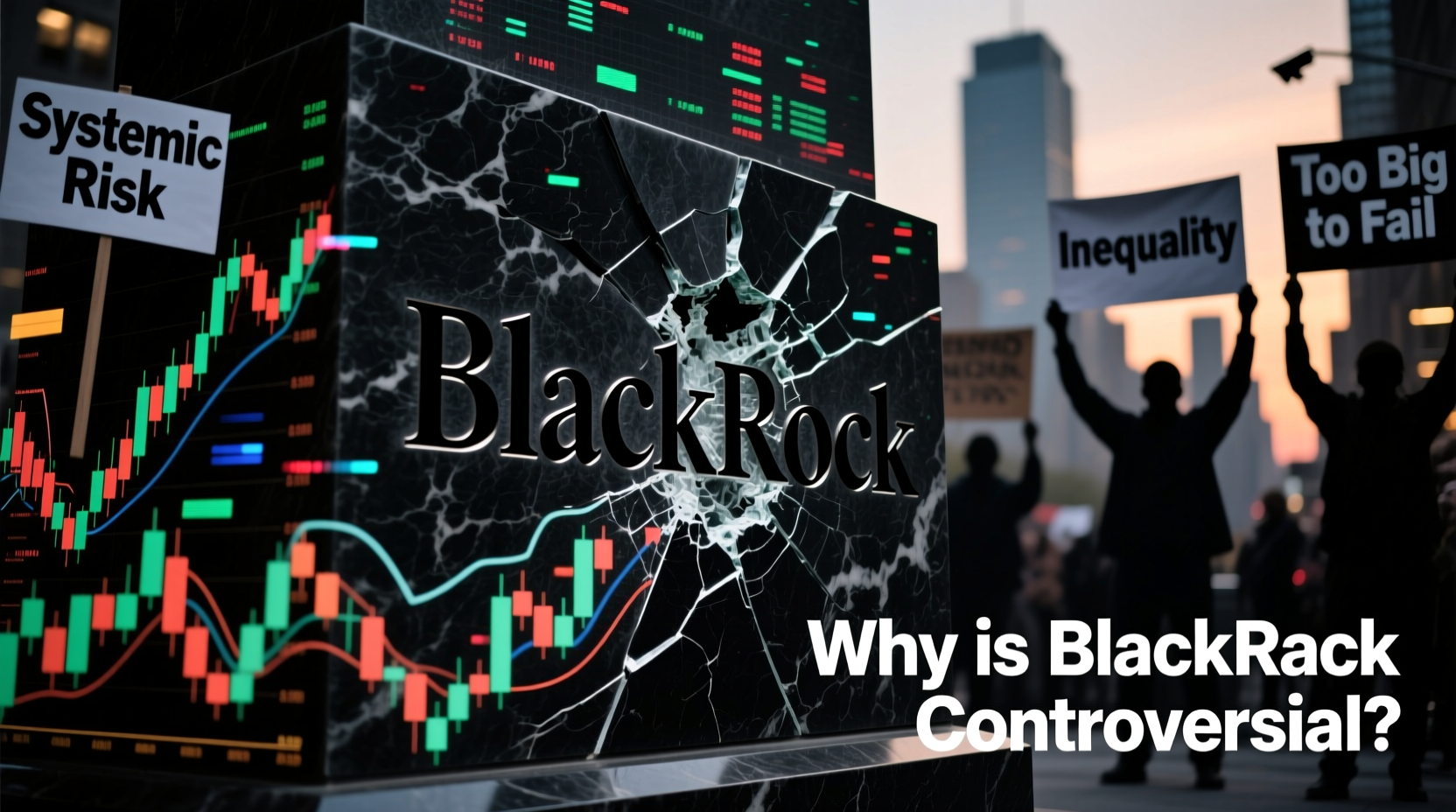BlackRock, the world’s largest asset management firm with over $10 trillion in assets under management, plays a pivotal role in global financial markets. While it is often praised for innovation—particularly its development of exchange-traded funds (ETFs) and risk management tools like Aladdin—it has also become a focal point of intense scrutiny and criticism. From concerns about monopolistic market influence to its aggressive advocacy of environmental, social, and governance (ESG) principles, BlackRock sits at the intersection of finance, politics, and public policy. This article examines the core reasons behind the controversy surrounding BlackRock, analyzing both legitimate concerns and broader debates about corporate power in the 21st century.
Market Dominance and Systemic Risk

One of the most persistent criticisms of BlackRock is its sheer size and reach. As the top shareholder in major corporations across sectors—including Apple, Microsoft, ExxonMobil, and Johnson & Johnson—BlackRock wields unprecedented influence over corporate governance and strategic decisions. Critics argue that such concentrated ownership creates a de facto oligopoly in capital markets.
Because BlackRock manages index funds that passively track broad market benchmarks, it often holds stakes in nearly every large company. This leads to \"common ownership,\" where one institution owns shares in competing firms within the same industry. Economists have raised concerns that this structure may reduce competition, as companies with shared shareholders may be less inclined to engage in aggressive pricing or innovation battles.
“BlackRock is not just big; it’s structurally embedded in the financial system in a way that gives it outsized influence without direct accountability.” — Dr. Luigi Zingales, Professor of Economics, University of Chicago Booth School of Business
This concentration amplifies systemic risk. In times of market stress, BlackRock’s massive ETF holdings can exacerbate volatility. During the March 2020 market crash, for example, liquidity dried up in certain bond ETFs managed by BlackRock, prompting the Federal Reserve to step in and purchase those funds as part of emergency lending programs—a move that sparked debate over moral hazard and public subsidization of private financial institutions.
Role in Government Crises: The “Crisis Manager” Label
BlackRock’s repeated involvement in government-led financial interventions has fueled perceptions of undue influence. The firm was hired by the U.S. Federal Reserve during both the 2008 financial crisis and the 2020 pandemic to help design and manage emergency lending facilities. Similar roles were assumed by BlackRock in Europe and other regions.
Critics question the ethics of a private corporation advising central banks on bailout programs while simultaneously managing investment products that could benefit from those same policies. This revolving door between public institutions and private finance raises transparency and conflict-of-interest concerns.
ESG and the Politics of Sustainable Investing
Under CEO Larry Fink, BlackRock has been a vocal proponent of ESG investing, urging companies to address climate change, improve board diversity, and prioritize long-term stakeholder value over short-term profits. While these positions align with growing investor demand for sustainability, they have ignited fierce political backlash—particularly in the United States.
Several Republican-led states have initiated divestment campaigns from BlackRock-managed funds, accusing the firm of promoting a “woke” agenda that prioritizes ideology over returns. Florida, Texas, and West Virginia have taken steps to sever financial ties, citing opposition to what they describe as ESG-driven restrictions on fossil fuel investments.
The controversy reflects a deeper tension: Should asset managers use their influence to drive social change, or should they remain strictly neutral fiduciaries focused solely on maximizing shareholder returns?
BlackRock maintains that ESG factors are material risks that affect long-term performance. Climate-related disruptions, regulatory shifts, and reputational damage can all impact profitability. However, opponents argue that ESG initiatives amount to political activism and may compromise investment neutrality.
Key ESG Controversies
- Accusations of greenwashing: Critics claim BlackRock continues to invest heavily in fossil fuels despite public commitments to net-zero emissions by 2050.
- Influence over corporate boards: BlackRock uses its voting power to push for sustainability disclosures, drawing ire from conservative lawmakers.
- Global policy alignment: BlackRock supports international climate agreements, which some view as overreach beyond its financial mandate.
Ownership vs. Accountability: The Governance Dilemma
As a passive investor, BlackRock typically avoids direct management of the companies it owns. Yet its scale grants it significant proxy voting power. In 2023, BlackRock cast votes on over 70,000 director elections and shareholder proposals globally.
This raises a fundamental governance question: Can an institution with no intention of running companies responsibly shape their strategies? Critics argue that BlackRock exercises influence without assuming responsibility—a form of \"steering without steering.\"
Moreover, because BlackRock’s clients include pension funds, insurance companies, and individual investors, its voting decisions indirectly reflect diverse interests. Yet there is limited transparency into how BlackRock formulates its voting guidelines or balances competing priorities.
“BlackRock is the closest thing we have to a global central bank of capitalism—but it answers to no electorate, no legislature, and no regulator with full authority.” — Bethany McLean, Financial Journalist and Co-Author of *All the Devils Are Here*
Real-World Example: The Texas Divestment Move
In 2022, Texas passed legislation requiring state entities to divest from financial firms deemed “boycotting fossil fuels.” BlackRock was placed on the state’s “scrutinized companies” list due to its ESG policies. As a result, the Texas Treasury removed approximately $800 million from BlackRock-managed funds.
The case highlights how geopolitical and ideological divides are increasingly shaping financial relationships. While BlackRock argued that its approach was financially motivated—not political—the state maintained that any restriction on energy investments constituted economic discrimination.
This incident underscores a growing trend: asset managers are being forced to navigate not just market risks, but also regulatory fragmentation and cultural polarization across jurisdictions.
Checklist: Evaluating Institutional Influence
To critically assess the role of dominant financial institutions like BlackRock, consider the following:
- Ownership Transparency: Can you trace who ultimately benefits from investment decisions?
- Voting Record: Is the firm’s proxy voting history publicly accessible and aligned with stated principles?
- Conflict Disclosure: Does the firm disclose when it advises governments while managing private funds?
- ESG Integration: Are sustainability criteria applied consistently, or do exceptions suggest double standards?
- Liquidity Management: How does the firm handle redemptions during market stress, especially in ETFs?
Comparison: BlackRock’s Role in Crises
| Crisis | BlackRock’s Role | Criticisms |
|---|---|---|
| 2008 Financial Crisis | Advised the Federal Reserve on asset-backed securities purchases | Perceived conflict of interest; lack of competitive bidding |
| 2020 Pandemic Crash | Managed portfolio selection for Fed’s corporate bond buying program | Questions about favoritism; opacity in fund selection |
| European Debt Crisis (2010–2012) | Consulted ECB and national governments on debt restructuring | Private firm influencing public fiscal policy |
Frequently Asked Questions
Is BlackRock a government agency?
No, BlackRock is a private, publicly traded company (NYSE: BLK). However, it has frequently been contracted by government agencies like the U.S. Federal Reserve and the European Central Bank to provide advisory and portfolio management services during financial crises.
Does BlackRock control the stock market?
BlackRock does not “control” the market in a direct sense, but its ownership stakes in major companies and dominance in passive investing give it substantial indirect influence. It is the largest shareholder in many S&P 500 firms, affecting corporate governance through voting power and engagement.
Why do some states ban BlackRock?
Several U.S. states, including Texas and Florida, have restricted business with BlackRock due to its ESG investment policies, particularly those related to climate change and fossil fuels. These states allege that such policies constitute economic discrimination against the energy sector.
Conclusion: Power, Responsibility, and the Future of Finance
The controversy surrounding BlackRock is not merely about one company—it reflects broader anxieties about concentration of power in unaccountable institutions. As financial markets grow more complex and interconnected, the line between private enterprise and public stewardship blurs. BlackRock’s innovations have democratized investing and improved risk management for millions. Yet its scale, political entanglements, and ideological stances demand careful scrutiny.
Transparency, regulatory oversight, and diversified ownership models are essential to ensuring that no single entity becomes too central to the functioning of global capitalism. Whether you see BlackRock as a steward of sustainable growth or a symbol of unchecked financial power, one fact remains clear: understanding its role is critical to understanding the modern economy.









 浙公网安备
33010002000092号
浙公网安备
33010002000092号 浙B2-20120091-4
浙B2-20120091-4
Comments
No comments yet. Why don't you start the discussion?